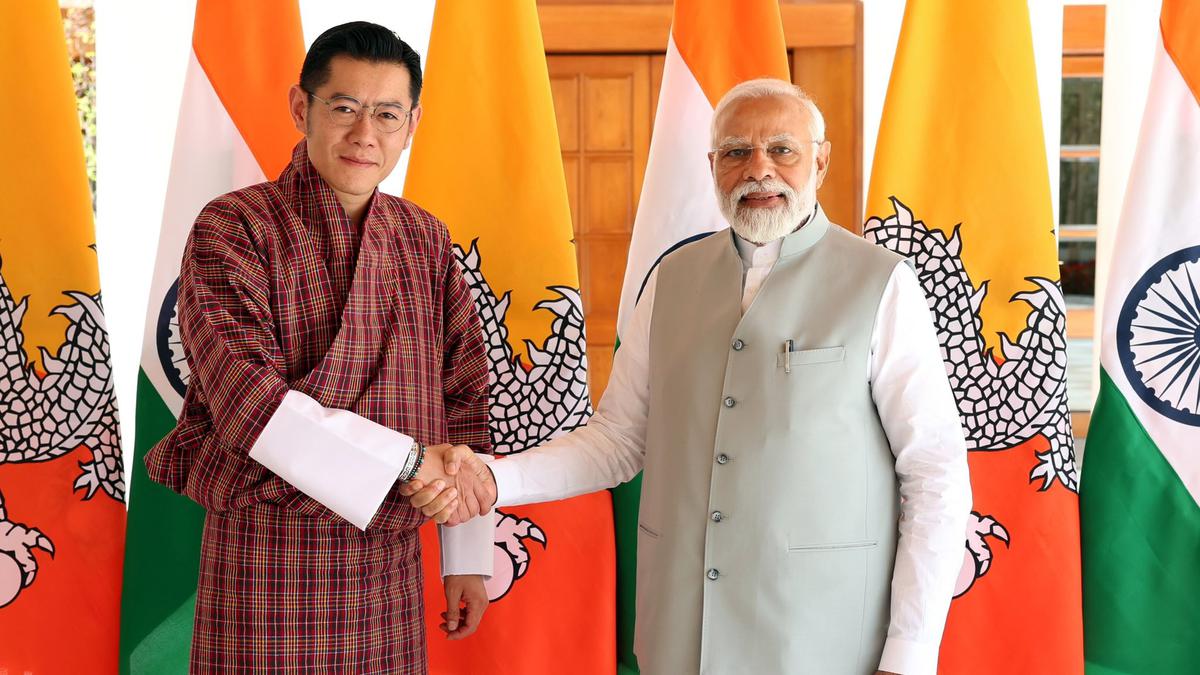News Highlights:
- Recently, Prime Minister Narendra Modi held talks with Bhutanese King Jigme Khesar Namgyel Wangchuck in New Delhi related to bilateral ties and issues of national interest.
- Both nations discussed the latest situation along the India-Bhutan border and the progress in boundary talks between China and Bhutan, particularly above the Doklam trijunction point.
India-Bhutan Relations:
- Background of relations:
- India and Bhutan share unique and exemplary bilateral relations, which are based on mutual trust, goodwill and understanding. Formal diplomatic relations between India and Bhutan were established in 1968.
- The basic framework of India-Bhutan relations is the Treaty of Friendship and Cooperation signed in 1949 between the two countries, which was renewed in February 2007.
- The bilateral ties have been advanced by regular high-level exchanges between the two countries.
- India re-negotiated the 1949 treaty with Bhutan and signed a new treaty of friendship in 2007. The new treaty replaced the provision requiring Bhutan to take India’s guidance on foreign policy with broader sovereignty and did not require Bhutan to obtain India’s permission over arms imports.
- Economic Importance:
- The trade between the two countries is governed by the India-Bhutan Trade and Transit Agreement of 1972.
- The revised Bilateral Agreement on Trade, Commerce and Transit between India and Bhutan was enacted in 2017 and would be valid for ten years.
- India is Bhutan’s largest trading partner.
- In 2020, bilateral trade accounted for 82.6% of Bhutan’s total trade.
- Imports from India account for more than 77.1% of Bhutan’s total imports.
- Bhutan’s exports to India constituted 90.2 % of its total exports.
- Benefits to the North Eastern States: Increased trade and commerce relationship with Bhutan will greatly benefit landlocked Arunachal Pradesh and Assam.
- Hydropower Cooperation:
- India has constructed three Hydroelectric Projects (HEPs) in Bhutan: Chukha HEP, Kurichhu HEP and Tala HEP, which are operational and exporting surplus power to India.
- Recently, India completed a 720 MW Mangdechhu Hydroelectric Power Project, and both sides are in process of expediting the completion of other ongoing projects, including the 1200MW Punatsangchhu-1 & 1020MW Punatsangchhu-2.
- Mutually beneficial hydro-power cooperation with Bhutan forms the core of bilateral economic cooperation.
- Development Partnership:
- India has been extending economic assistance to Bhutan’s socio-economic development since the early 1960s when Bhutan launched its Five Year Plans.
- India continues to be the principal development partner of Bhutan.
- For the 12th Five Year Plan, India’s contribution of Rs. 4500 cr. will constitute 73% of Bhutan’s total external grant component.
- At present, over 82 large and intermediate projects and 524 Small Development Projects/HICDPs are at various stages of implementation in Bhutan.
- Military cooperation:
- A 2,000-strong Indian Military Training Team (IMTRAT) is permanently based in western Bhutan to train the Royal Bhutan Army, while other units regularly cooperate with the Royal Bhutan Army.
- Diaspora:
- India is the most popular educational destination for Bhutanese students -almost 4000 Bhutanese students are enrolled in Indian Universities at any time, many of whom are also provided scholarships by Govt. of India.
Strategic Importance of Bhutan
- Buffer State:
- Bhutan is important to India as a buffer state as it acts as a defence against China by protecting the chicken neck corridor.
- The Siliguri Corridor, or Chicken’s Neck, is a narrow stretch of land of about 22 kilometres. It is located in the Indian state of West Bengal, which connects India’s north-eastern states to the rest of India, with the countries of Nepal and Bangladesh lying on either side of the corridor.
- The Doklam stand-off re-established the strategic significance of Bhutan for India.
- Destination for Indian investment:
- Bhutan provides a market for Indian commodities and is a destination for Indian investment.
- Also, for India, Bhutan is a rich source of hydropower.
- Mutually beneficial hydro-power cooperation with Bhutan forms the core of bilateral economic cooperation.
- Security:
- A politically stable Bhutan is important to India.
- An unstable and restive Bhutan can provide a safe haven to anti-India activities and anti-India militant groups.
Challenges:
- Indian Influence in Bhutan’s internal affairs:
- There have been instances when India has meddled in Bhutan’s internal affairs.
- This has led to a negative perception of India in the minds of the Bhutanese.
- Cheap rates for hydropower:
- There is a growing feeling in Bhutan that India’s development of Bhutan’s hydropower production is driven by self-interest as it is getting Bhutan’s surplus power at relatively cheap rates.
- Camps by militant outfits:
- From an internal security perspective, the illicit establishment of camps by militant outfits in the dense jungles of southeast Bhutan is a cause of concern for both nations.
- China’s Influence:
- China’s continuous claims to important border areas such as Chumbi Valley and Doklam and its continuous efforts to establish strong diplomatic and economic relations with Bhutan have been a continuous source of concern for India.
- Environmental concerns on MVA:
- The original Motor Vehicles Agreement (MVA) of the sub-regional Bangladesh-Bhutan-India-Nepal (BBIN) grouping was signed by all four countries in June 2015, but after objections in Bhutan over sustainability and environmental concerns, the Bhutanese parliament decided not to endorse the plan.
Pic Courtesy: The Hindu
Content Source: The Hindu



